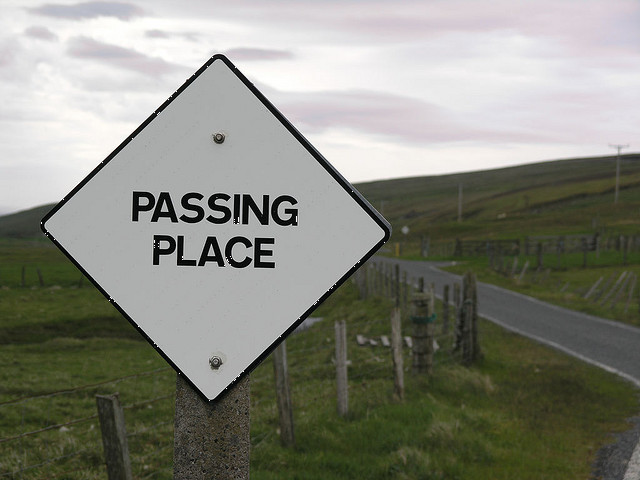Pase or Pasele are words I hear many times during my day here in Mexico.
In Spanish, it literally means “pass” or “pass yourself,” but translates to “Go on,” or “You first.”
“Please. I insist.”
It is often accompanied by an open handed gesture and a smile. Sometimes, there is even a kindness stand-off, with two people gently insisting they be the one to step aside.
One of the reasons for this gesture, in the small town where I live, is practical. The sidewalks are very narrow and there are no stop signs or traffic lights. This requires that the slow walkers give a bit of a berth to the slightly faster ones.
And cars arriving at the intersection automatically allow pedestrians to move before they do.
The other, less practical reason is that, for the most part, people here are polite.
Smiles from passersby are frequent and, usually, no one is in a hurry.
Pass is one of those words that has many varied and colloquial uses. It swings wildly in meaning, from “making a pass” as in an amorous advance, to being “passed over” for a job or some other opportunity.
I got to thinking about this simple word, its multiple uses and interpretations, and wondered whether it could move into a deeper context than its simplicity suggests.
Unlike Mexico, in some cultures, maybe this type of aforementioned “pass” is not so freely given. In the U.S, for example, we are typically not taught to hang back. On the contrary, we often feel like we need to get ahead, to be competitive, to win. Indeed, these are considered to be desirable traits—ones that we are encouraged to strive for from an early age.
Children in elementary school are taught that winning equates to success. The sticker or prize or trophy is the reward—not any sense of internal accomplishment or satisfaction with a job well done. This “getting ahead” creates an awful lot of hurrying, which creates an awful lot of stress and anxiety.
In English, to “give someone a pass” usually means to give them a break, let something go, or tolerate a slight, perhaps. How does it feel to give someone a pass? Giving it grudgingly notwithstanding, the act of giving someone a pass helps to cultivate compassion and patience.
Our species doesn’t do waiting all that well. Is this a wonder when most of us have grown up in a world that teaches that to wait means to get behind? You snooze you lose, right? Our language is even peppered with these “hurry up” phrases.
We refer to the “rat race,” a “hamster on a wheel,” “survival of the fittest.”
But there is another approach I have found that has personally delivered me from a lot of anxious nail-biting—and that is to just allow.
When we frame “wait” in this way, we ask ourselves to slow down; just flow, just observe. Waiting feels like time spent in limbo—or worse, purgatory. Allowing seems to conjure a vision of floating peacefully on a soothing river, bubbling along with the current.
While waiting, we are clenched; in allowing, we are released.
Long ago, as a young art student, I learned a valuable lesson from the creative process about waiting. I used to get anxious when a painting wasn’t gelling for whatever reason. I couldn’t figure it out, or I couldn’t move forward. I decided once, to leave alone a particular painting that was giving me trouble. Rather than think about it so much, I put it aside—but always within sight—and moved on to another piece.
Most artists work on many paintings at once for this very reason.
This particular painting sat in my studio for almost a year until one day, I suddenly realized how it needed to be resolved. Just like that.
In that moment, I understood that life predicaments operate in much the same way. I began to cultivate a trust that, given time, most questions naturally answer themselves.
My Tibetan teacher is always talking to his students about space and how it is the stuff of clarity. He jokes that we always think “If only I had the missing information,” or “If only I had one more person’s opinion, then I could figure this thing out.”
The problem is we don’t need more information, or more thoughts.
What we need is more space. We need more time. We need to give ourselves a pass.
Consider it as a fruitful freebie. Perhaps the right information has not presented itself yet.
Sometimes, though, we don’t find it by looking—but by waiting to receive it. This receiving seems like a way to be more patient and polite with ourselves and, by extension, with others.
Don’t mistake this for being passive; on the contrary, our waiting should be accompanied by the sharp lens of attention. We need to be aware when the information does come seeping, skidding or speeding like a racing tsunami into our consciousness. This practice is active waiting and can dramatically change the way that we process information.
When we say that we “pass something on,” we mean that we give someone something that has been given to us. This can be tangible, of course, such as a valuable heirloom, or it can simply be loving support or counsel during a hard time.
We empathize with a friend going through a rough patch and we remember how someone similarly helped us once. There is a lot of evidence out there that suggests when we pass on a kind word, a compliment, or a helpful gesture—especially to a stranger—that person is more likely to treat the next person they encounter in kind.
A pass.
Such a simple word. Just hearing it causes my body to relax just a little bit more, like a mental massage creating a clear, cerulean sky in my otherwise cluttered mind.
Like the church bells that ring regularly where I live and serve to bring me back here from wherever I might have been, I am also fortunate that when I am walking the streets of my small Mexican town, and I hear the friendly pasele from someone in my path, it is another golden opportunity for me to slow down, to wait actively, to smile and to pass on in whatever form I can, that pass to my fellow humans.
Relephant:
Word Magic. {Inspiring Video}
Author: Linda Laino
Assistant Editor: Hilda Carroll / Editor: Renee Picard
Photo: Paddy Patterson/Flickr







Read 3 comments and reply